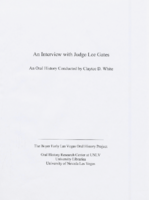Search the Special Collections and Archives Portal
Search Results

Transcript of interview with Helen H. Holmes by Marilyn Swanson, February 12, 1975
Date
Archival Collection
Description
On February 12, 1975, collector Marilyn Swanson interviewed housewife, Mrs. Helen H. Holmes (born Helen Hanson on February 24th, 1906, in Harrison, Nebraska) in her home in Boulder City, Nevada. This interview covers the social, economic, and environmental changes that occurred in Boulder City from 1931 to 1975. Mrs. Holmes also discusses home and family life in Nevada.
Text
T-Shirt Color: Navy Blue; Front: Fire Odessa Dept., Fire Emblem W/Fire Equip; Back: Paramedic OFD; Handwritten Text: HC (Ret) Cotton #76 J.T. Cotton #22 JS Cotton #76 Damien Martel #125 B. Amonett #132 Tony Reyes #73 Curtis Sydow #50 Wayne Mass #16 Philip Tally #120 Odessa, TX, approximately 2001-2012
Level of Description
Archival Collection
Collection Name: New York-New York Hotel and Casino 9-11 Heroes Tribute Collection
Box/Folder: Box 406
Archival Component

Transcript of interview with John and Mabel Dillingham by Sonny Le Jeune, March 19, 1978
Date
Archival Collection
Description
On March 19, 1978, John (Sonny) Le Jeune interviewed John (born 1904 in Trail Creek, Idaho) and Mabel Dillingham. The two provide many historical accounts of Las Vegas, Nevada, including John’s work on the railroad, the development of the city, and their living conditions when first moving to Las Vegas. The three also discuss prominent members of the community, recreational activities, church membership, and popular attractions around Las Vegas. Other topics include the building of Hoover Dam, the site of the Stewart Ranch, early irrigation systems, flood control, and Block 16.
Text

Transcript of interview with Stephen La Thair Hawley by Donna Mattson, June 24, 1975
Date
Description
On June 24, 1975, collector Donna Mattson interviewed native Nevadan mechanic, Stephen La Thair Hawley, (born October 15th, 1936, in Ely, Nevada) in his home in Las Vegas, Nevada. This interview offers a historical overview of early Las Vegas including gambling and an in-depth discussion on local economic, environmental, and social changes.
Text

Transcript of interview with Jack Cornell by Richard Fesler, February 18, 1979
Date
Archival Collection
Description
On February 18, 1979, Richard Fesler interviewed Jack W. Cornell (born 1918 in Manhattan, Nevada) about his experiences living in Nevada. The two first discuss historical buildings, including the Nye County Courthouse, and Cornell describes his family background and the different locations at which his ancestors lived. Cornell then talks about his experiences as an airplane mechanic for the Army Air Corps during World War II and the different countries he would visit during that time. The two also discuss the effects of the Depression, Cornell’s work in automotive body repair, and his recreational activities. Cornell also describes an experience in which he assisted an air escort for President Roosevelt, and he also describes when he witnessed one of the atomic tests. The interview concludes with Cornell’s thoughts on how the rural area in Manhattan has changed over time.
Text
Westside School Groundbreaking Ceremony
Identifier
Abstract
Westside School Groundbreaking ceremony including Brenda Williams, Hannah Brown, Ricki Barlow, Carolyn Goodman and others on January 17, 2015 for the African Americans in Las Vegas: a Collaborative Oral History Project. In this groundbreaking ceremony, Mayor Carol Goodman and City Councilman Ricki Barlow talk about the significance of the location of the school and its surrounding community. Brown discusses funding for the project and her upbringing in West Las Vegas. Lastly, Williams describes her vision for the Westside community and the renovation of the property.
Archival Collection

Transcript of interview with Richard "Curley" Francis by Connie Degernes, March 4, 1975
Date
Archival Collection
Description
On March 4, 1975, collector Connie Degernes interviewed truck driver and rigger, Richard L. (Curley) Francis (born on July 27, 1907 in Compton, California) in his home in Boulder City, Nevada. The main focus of this interview is the construction of the Hoover Dam. Mr. Francis discusses the various occupations he has held since relocating to Nevada, including, Cat Skinner, truck driver, cableway operator, rigger foreman, and crane operator. He also talks about working for the government and the Six Company in Las Vegas.
Text

Transcript of interview with Judge Lee Gates by Claytee D. White, December 5, 1996
Date
Archival Collection
Description
Interview with Judge Lee Gates conducted by Claytee D. White on December 5, 1996. Born in Louisiana, Gates moved to Las Vegas around 1960. Following high school, he attended UNLV, where he was a member of the Black Student Association and studied under professor Roosevelt Fitzgerald, who raised his awareness of black history. Gates participated in the civil rights movement and worked as a lawyer before becoming a judge. He discusses Jackson Street, Dr. Charles West, attorney Charles Kellar, and his own involvement with Ruby Duncan's group.
Text

Hildred Meidell interview, February 27, 1979: transcript
Date
Archival Collection
Description
On February 27, 1979, collector Greg Abbott interviewed Hildred Meidell (b. March 17, 1900 in Webb City, Missouri) about her time living in Las Vegas, Nevada. Meidell covers a range of topics, from her and her husband’s time as tourists in the city and their subsequent retirement to Las Vegas from Los Angeles, California. Meidell describes the Las Vegas Strip, the interstate and highway conditions between Los Angeles and Las Vegas, as well as their numerous visits to Hoover Dam (Boulder Dam). Moreover, she speaks about the changing layout of the city, the increase in shopping centers and department stores, and the clothing stores inside of hotels. Lastly, Meidell talks about the prominence of churches in local communities, the atomic testing program and the structural damages these tests caused in her neighborhood, and the influence of the railroad and passenger train on the town.
Text

Transcript of interview with Charles T. "Blackie" Hunt by Cork Proctor, July 3, 2003
Date
Archival Collection
Description
Charles T. "Blackie" Hunt, born in Pottstown, Pennsylvania in 1930, started accordion lessons at age five. He recounts learning from experienced musicians, then teaching others at age twelve because his teacher was drafted. He attended West Chester State Teachers College where, among other accomplishments, he put together a group with Nick Carlino as tenor sax player. Blackie shares detailed memories of the many musicians with whom he worked and toured. They played in venues that included Harrisburg, Toronto, and Montreal, and eventually were offered a booking at the Sahara Hotel in Las Vegas. The group that Blackie worked with in Las Vegas, Tahoe, and Reno came up with the name "The Characters" (backward 'e'), and the show featured comedy and music. It was during this time that he met Lorraine (stage name Lauri Perry), who had her own group. They were married after a couple of years and Lauri joined The Characters. Blackie and Lorraine Hunt opened Blackie's Bar on Tropicana and Eastern Avenues in the seventies. He talks about the jazz sessions that took place and the musicians who sat in on them, and how he and Lorraine eventually decided to bow out of show business themselves. The Hunts went on to open the Bootlegger, a restaurant/piano bar on Las Vegas Boulevard. They started a little comedy/music session called "Off the Cuff', in which local or touring musicians, comedians, and singers often participate. Blackie and Lorraine have been part of the vibrant history of Las Vegas and the state of Nevada for many years, and continue to make their home here.
Text
